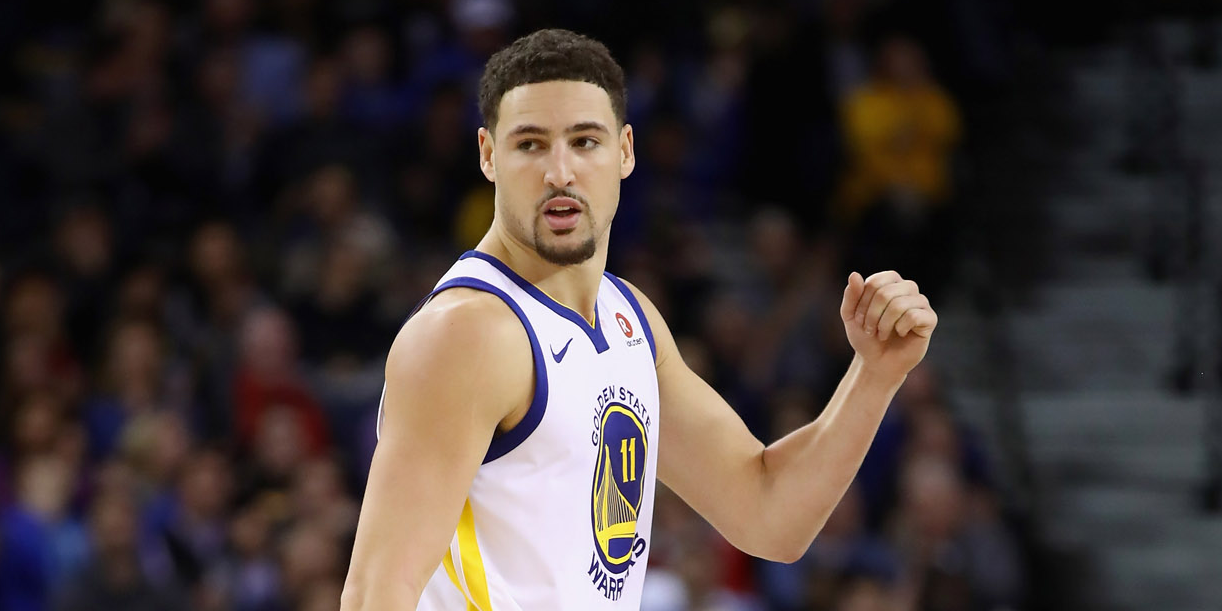- Klay Thompson said in an interview that he wanted to stay with the Golden State Warriors but would hit free agency next summer.
- If Thompson hits free agency and turns down contract extensions, he may be looking for a significant pay raise, one that would add to the Warriors’ already-hefty payroll.
- As Thompson looks for a new contract, with Kevin Durant and Draymond Green soon to follow, the Warriors’ payroll could balloon to $300 million with taxes.
- It will be worth seeing how much the Warriors are willing to pay to keep this juggernaut together, especially as their championship window closes down the line.
The biggest hurdle for the Golden State Warriors in the coming years will be figuring out how to pay each of their stars to keep the team together.
Klay Thompson is up first next summer. Thompson has reiterated that he wants to stay with the Warriors, and the Warriors would like to keep him. The Athletic’s Marcus Thompson reported in May that Thompson and the Warriors had already talked about an extension, one that could save the Warriors as much as $50 million.
But in an interview with Mark Medina of The Mercury News over the weekend, Thompson suggested that while he still wanted to stay with the Warriors, he intended to hit free agency.
“I’ve said it many times before: I would like to be a Warrior for life,” Thompson said. “Contract negotiations are way down the line. But I think we all have the same interest. I would love to be here for the rest of my career.”
He added of signing an extension this season: "It's tough to say. I'd definitely be interested. But at the end of the day, I'm going to be a free agent in 2019. Number one on my list would obviously be to stay with the Warriors."
As Marcus Thompson reported, the Warriors had conversations with Thompson about an extension starting at $23 million a year. That would come out to a roughly four-year, $92 million extension.
If Thompson becomes a free agent, however, another team could offer him a deal worth as much as $139 million over four years.
If Thompson were to become a free agent, there would most likely be teams willing to offer him that max deal (or somewhere close to it). That would force the Warriors to match or at least pay something close to another team's offer.
The problem is the amount of money the Warriors are already paying for their roster. Stephen Curry is locked in to a super-max deal that will pay him $166 million over the next four years. Draymond Green is owed $36 million over the next two seasons before his deal is up. Kevin Durant will have a $31 million player option next summer. Andre Iguodala is owed about $33 million over the next two seasons.
The roster is set to become historically expensive, particularly because of the tax penalties.
The Warriors' general manager, Bob Myers, explained to Tim Kawakami of The Athletic how the Warriors were hesitant to use their $5 million mid-level exception this offseason because adding $5 million in salary to the roster was really like adding $20 million because of taxes. They ended up using it on DeMarcus Cousins, with Myers arguing that a player of Cousins' talent was worthwhile.
"We were reluctant to do the mid-level because of what it cost us," Myers told Kawakami. "You know this because you're pretty educated. But $5 million for us is, yes, the player gets $5 million, but it costs us $20 (million with luxury-tax penalties). So it's a $20 million acquisition for us, which, you don't do that lightly."
If Thompson turns down extensions to hit free agency, it would suggest he wants to make more than what the Warriors are offering. Thompson is set to make $18.9 million this season. If his next deal paid him, say, $7 million more annually to $26 million a year, it would add to an already hefty payroll for the Warriors, as Myers explained.
As Kawakami has written, the Warriors are willing to spend almost anything, because their new arena - the Chase Center, expected to open for the 2019-2020 season - is meant to be a major source of revenue. If the Warriors keep their four All-Stars together at top dollar, it's possible that their payroll balloons to $300 million. The Chase Center should help cover that cost.
But there is a condition to spending that money.
From Kawakami (emphasis ours):
"Whether it's in 2019-20, or a year or two after that, the Warriors are looking at the very real possibility - if not quite inevitability - of a $300 million annual player payout, if you count luxury-tax penalties."
...
"That's if Warriors management wants to keep this star-studded roster together, and you can presume that for as long as the team stacks up Larry O'Brien trophies, Warriors ownership will want to keep as many of the headliners as possible for as long as possible."
Therein lies the big question: Will ownership pay historic prices for a team that doesn't win a championship?
That may sound ludicrous, given the dominance of this team over the past four years and the way it's set up to once again dominate this season. But last year the Houston Rockets took the Warriors to seven games in the Western Conference Finals. The Warriors faced the very real possibility of not making the championship. Dynasties tend to end sooner than most expect, and other NBA teams have made clear that they don't plan to sit and wait for the Warriors' run to end.
This coming summer will mark the beginning of the Warriors' biggest test. Can they re-sign everyone to prices that work for both sides, especially as they enter what figures to be the back end of their dominance? Even if this Warriors team has another three years of championship contention in them, their payroll will only continue to climb as they re-sign all of the key players.
Thompson may be an illustrative example of this coming test. The Warriors will re-sign him, but how much will it cost them, and for how long will they pay any price to keep the team together?

